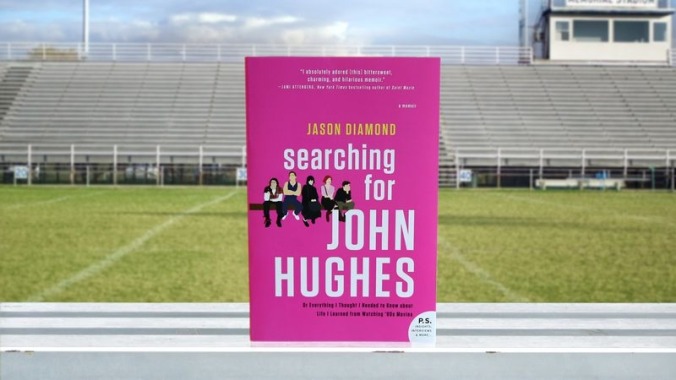In the 1980s, few films resonated with teens as much as those by John Hughes. Portraying teen life in the Chicago suburbs, films like Sixteen Candles and The Breakfast Club coupled humor with angst to portray the bittersweet experience of adolescence. Jason Diamond’s memoir Searching For John Hughes recounts his deep-rooted obsession with Hughes and long attempt to write a biography about the cult Hollywood director. The result is mixed, as Diamond combines incautious candor and self-pity in his arduous decade-long adventure.
Beginning with his painful childhood—one which saw his father regularly beat him and his mother shuffle him between psychiatrists—Diamond turned to Hughes’ films for emotional respite and escapist pleasure. Movies like Ferris Bueller’s Day Off and Pretty In Pink represented important “blueprints” to life for this one “weird kid nobody knew.” When he comes of age, Diamond leaves his hometown of Chicago—the setting of most of Hughes’ films—for New York, eager to start life anew as a writer. His first project: a biography of John Hughes.
But Diamond soon lets this obsession consume him. When he hits a roadblock in his research, he lies to publicists to try and interview some of Hughes’ former stars (including Joan Cusack) while greatly inflating the progress of his book to friends and former classmates to make it sound more meaningful and lucrative than it is. As he spends years working away on this seemingly impossible manuscript, Diamond recalls painful episodes from his 20s: near homelessness, alcohol-fueled binges, and lonely weekends watching (and rewatching) Hughes’ films. “I [would] always let the tape run out,” he writes.
Searching For John Hughes’ strength lies in Diamond’s intensely personal references to Hughes’ body of work and his light cultural criticism of the films. (“In Home Alone, we’re presented with the epitome of Hughes’ Rockwellian vision of a place with people of a higher tax bracket.”) Moreover, Diamond’s reflections on both suburbia—the way it both castigates and liberates—and Hughes are thoughtful and considered, offering a refreshing understanding about the way Hughes was so drawn to these suburban landscapes.
There are shortcomings in Diamond’s book, the first of which is that little is actually revealed about Hughes—in spite of the extensive research Diamond apparently did—as Hughes acts in more figurative than literal terms in the story. Diamond often permits his self-pity to get the best of him, endlessly recounting moments of rejection—from editors, agents, parents, friends—which finally wear the reader down. These episodes turn continually into passages marked by intense cynicism and frustration, and often make it difficult to sympathize with Diamond, despite the many physical, financial, and emotional hardships he indeed experienced trying to complete this book.
Searching For John Hughes does nevertheless demonstrate not only how our cultural obsessions can be so all-consuming—and even a little self-destructive—but also how pop culture can be emotionally stabilizing and nourishing. Diamond’s tragicomic memoir attempts to offer readers some important life lessons, but falls short with its self-pity and solipsism.
Purchase Searching For John Hughes here, which helps support The A.V. Club.










![Rob Reiner's son booked for murder amid homicide investigation [Updated]](https://img.pastemagazine.com/wp-content/avuploads/2025/12/15131025/MixCollage-15-Dec-2025-01-10-PM-9121.jpg)

























![HBO teases new Euphoria, Larry David, and much more in 2026 sizzle reel [Updated]](https://img.pastemagazine.com/wp-content/avuploads/2025/12/12100344/MixCollage-12-Dec-2025-09-56-AM-9137.jpg)




